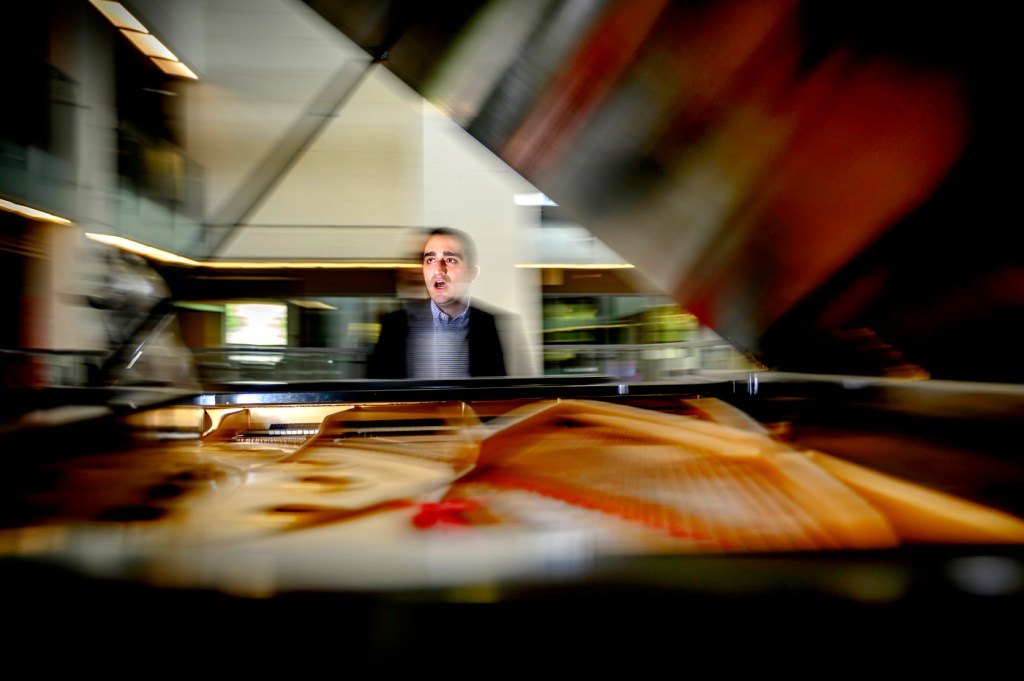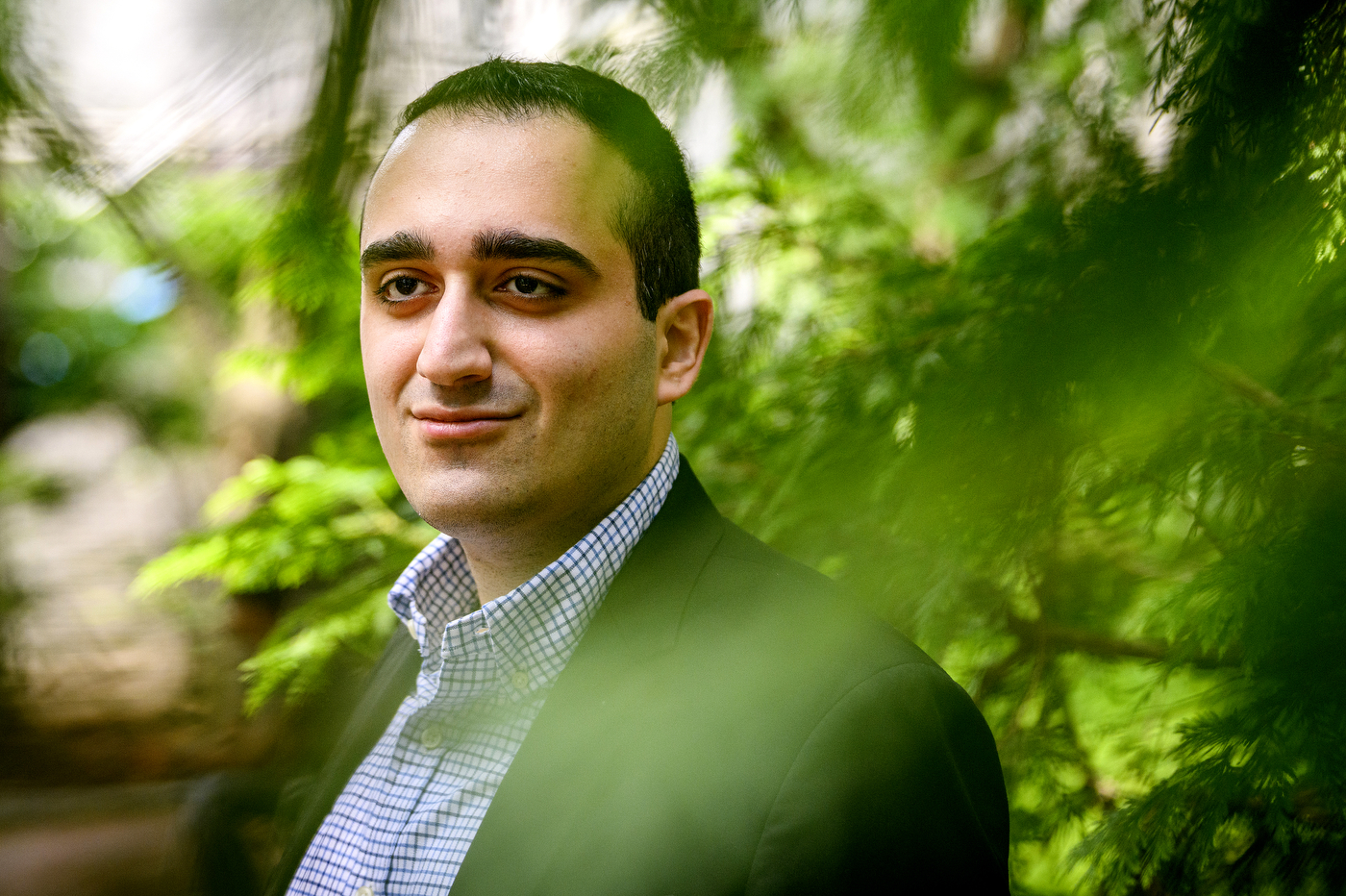Popera artist known as ‘Pavarotti of the Middle East’ aims for another hit after two songs on the charts

When his rendition of “Amazing Grace” and “Ave Maria” were listed at No. 21 and No. 86 on U.S. Spotify charts, Northeastern graduate Andrew Andraos found himself suddenly in the company of Ariana Grande and Bruno Mars.
At 25, Andraos knows that to remain among top-charting recording artists he’ll have to release an album and acquire a lot of fans. So he is working on doing both.
Last month he released a Spanish version of his popular original love song, “Amore Mio.” Release by release, Andraos says he plans to build an album in a musical “waterfall” tradition.
It’s been a labor of love, says Andraos, who graduated with a master’s degree in creative practice leadership from Northeastern University in 2021.
Born and raised in Lebanon to musical parents—his father is a professional singer—Andraos composed his first song at age 6 and learned to play drums, guitar and piano.



‘Pavarotti of the Middle East’
Although he didn’t have his first vocal lesson until the age of 18 after he moved to the U.S. to attend the Berklee College of Music, Andraos was considered a child prodigy in Lebanon.
Malek Maktabi, host of the TV show “Ahmar Bel Khat El Arid,” nicknamed him the “Pavarotti of the Middle East,” and Andraos, who is Catholic, achieved acclaim across Lebanon when at age 14 he composed a song commemorating the beatification of Pope John Paul II.
“It was ranked on iTunes also, when standard streaming wasn’t very common,” Andraos says.
He sometimes performs in Arabic to strains of Eastern instruments such as the qanun, a type of zither, and the nay, an end-blown flute.
But Andraos mostly defines his style as “the power of opera with the soul of pop.”
My goal is to make it appealing to a wider audience by mixing it with pop. My goal is to create a unique style, rather than imitating someone else.
Andrew Andraos, a Northeastern graduate and an operatic pop singer, composer and producer
‘Power of opera, with the soul of pop’
“My goal when it comes to operatic music is to make everyone love it. Opera is known to be for people who are over the age of 45, and it’s usually pure classical lyric opera.”
“My goal is to make it appealing to a wider audience by mixing it with pop,” Andraos says.
Operatic pop, also known as “popera,” is a subgenre of pop music in which singers perform in an operatic style or translate a classical song in a pop style.
A well-known example is the Three Tenors, a group popular in the 1990s and early 2000s consisting of Spaniards Placido Domingo and Jose Carreras and Italian Luciano Pavarotti—the same singer to whom Andraos was compared back home in Lebanon.
Also a tenor, Andraos says he fuses Western and Eastern influences to create his own voice.
“My goal is to create a unique style, rather than imitating someone else,” he says.
The Northeastern influence
Currently living in Boston and working as a producer at Brown University, Andraos credits Northeastern with helping him pursue a professional career in music.
“I’ve always felt very passionate about music and entrepreneurship. It was very challenging to find them both,” he says.
Andraos says when he found out about the master’s degree program at Northeastern, “I was like, ‘That’s it. That’s what I’ve been looking for.’ I was fortunate that they gave me a scholarship as well to attend.”
“It was an amazing experience,” he says, despite the impact of COVID-19 on live musical performances.
“Overall, the program helped shape my career in terms of my personal goals and my professional goals,” Andraos says.
It was while he was a student at Northeastern that his recording of “Amazing Grace” reached No. 21 on U.S. Spotify charts on Dec. 18, 2020.
The waterfall method
These days Andraos is working on producing versions of the 287 songs he has composed since childhood.
“This is the main goal,” he says, adding that up until now he has focused on his education and private performances.
“I’m putting my focus into producing these compositions and promoting them and distributing them to the world,” Andraos says.
“I’m doing something called ‘the waterfall.’ You release singles one at a time until there’s a full album.”
“So far, I’m really grateful that ‘Amore Mio’ has reached a lot of success,” Andraos says.
He wrote it in Italian, with the help of ghost writers, due to the romantic tradition associated with that language.
Since the song gained appeal in Mexico City and Spanish-speaking countries, he released a Spanish version July 14 titled “Amor Mio.”
Andraos says he plans to perform at concerts to build an audience of fans, adding that until now his performances have been mainly at private events, such as birthday parties, weddings and corporate events.
With his songs available on all streaming platforms and social media, Andraos says he hopes they will once again climb the charts. “That way people will recognize them.”
Cynthia McCormick Hibbert is a Northeastern Global News reporter. Email her at c.hibbert@northeastern.edu or contact her on Twitter @HibbertCynthia.






